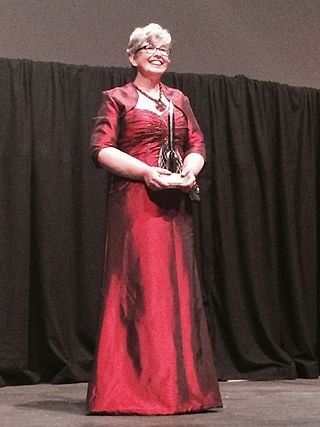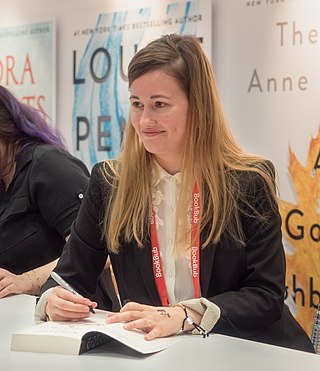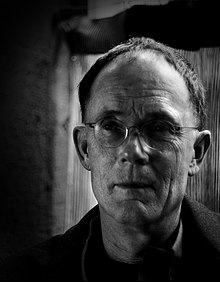
Gene Rodman Wolfe was an American science fiction and fantasy writer. He was noted for his dense, allusive prose as well as the strong influence of his Catholic faith. He was a prolific short story writer and novelist, and won many literary awards. Wolfe has been called "the Melville of science fiction", and was honored as a Grand Master by the Science Fiction and Fantasy Writers of America.

Michael Diamond Resnick was an American science fiction writer and editor. He won five Hugo awards and a Nebula award, and was the guest of honor at Chicon 7. He was the executive editor of the defunct magazine Jim Baen's Universe, and the creator and editor of Galaxy's Edge magazine.

Interzone is a British fantasy and science fiction magazine. Published since 1982, Interzone is the eighth-longest-running English language science fiction magazine in history, and the longest-running British science fiction (SF) magazine. Stories published in Interzone have been finalists for the Hugo Awards and have won a Nebula Award and numerous British Science Fiction Awards.

Ian McDonald is a British science fiction novelist, living in Belfast. His themes include nanotechnology, postcyberpunk settings, and the impact of rapid social and technological change on non-Western societies.
"The Winter Market" is a science fiction short story written by William Gibson and published as part of his Burning Chrome short story collection. The story was commissioned in 1985 by Vancouver Magazine, who stipulated that Gibson – who at the time was "unquestionably the leading Vancouver author on the international literary scene" – set it in the city.

Bone Dance is a 1991 novel by American writer Emma Bull, described variously as fantasy, hard science fiction and cyberpunk. It was nominated for the Hugo, Nebula and World Fantasy Awards in 1992.

The Nebula Awards annually recognize the best works of science fiction or fantasy published in the United States. The awards are organized and awarded by the Science Fiction and Fantasy Writers Association (SFWA), a nonprofit association of professional science fiction and fantasy writers. They were first given in 1966 at a ceremony created for the awards, and are given in four categories for different lengths of literary works. A fifth category for film and television episode scripts was given 1974–78 and 2000–09, and a sixth category for game writing was begun in 2018. In 2019 SFWA announced that two awards that were previously run under the same rules but not considered Nebula awards—the Andre Norton Award for Middle Grade and Young Adult Fiction and the Ray Bradbury Award for Outstanding Dramatic Presentation—were to be considered official Nebula awards. The rules governing the Nebula Awards have changed several times during the awards' history, most recently in 2010. The SFWA Nebula Conference, at which the awards are announced and presented, is held each spring in the United States. Locations vary from year to year.
Jason Sanford is an American science fiction author whose 2022 novel Plague Birds was a finalist for the Nebula and Philip K. Dick Awards. He's also known for his short fiction, which has been published in Interzone, Asimov's Science Fiction, Analog Science Fiction and Fact, Year's Best SF 14, InterGalactic Medicine Show and other magazines and anthologies.

Aliette de Bodard is a French-American speculative fiction writer.

Terry Carr's Best Science Fiction of the Year is an anthology of science fiction short stories edited by Terry Carr, the fourteenth volume in a series of sixteen. It was first published in paperback by Tor Books in July 1985, and in hardcover and trade paperback by Gollancz in October of the same year, under the alternate title Best SF of the Year #14.
Will McIntosh is a science fiction and young adult author, a Hugo-Award-winner, and a winner or finalist for many other awards. Along with ten novels, including Defenders,Love Minus Eighty, and Burning Midnight, he has published dozens of short stories in magazines such as Asimov's Science Fiction, Strange Horizons, Lightspeed Magazine, Clarkesworld, and Interzone. His stories are frequently reprinted in different "Year's Best" anthologies.
Rachel Swirsky is an American literary, speculative fiction and fantasy writer, poet, and editor living in Oregon. She was the founding editor of the PodCastle podcast and served as editor from 2008 to 2010. She served as vice president of the Science Fiction and Fantasy Writers of America in 2013.

Ken Liu is an American author of science fiction and fantasy. Liu has won multiple Hugo and Nebula Awards for his short fiction, which has appeared in F&SF, Asimov's, Analog, Lightspeed, Clarkesworld, and multiple "Year's Best" anthologies.

Ann Leckie is an American author of science fiction and fantasy. Her 2013 debut novel Ancillary Justice, in part about artificial consciousness and gender-blindness, won the 2014 Hugo Award for "Best Novel", as well as the Nebula Award, the Arthur C. Clarke Award, and the BSFA Award. The sequels, Ancillary Sword and Ancillary Mercy, each won the Locus Award and were nominated for the Nebula Award. Provenance, published in 2017, and Translation State, published in 2023, are also set in the Imperial Radch universe. Leckie's first fantasy novel, The Raven Tower, was published in February 2019.
This is a list of the published works of Aliette de Bodard.
"Magic for Beginners" is a fantasy novella by American writer Kelly Link. It was first published in The Magazine of Fantasy & Science Fiction in September 2005. It was subsequently published in Link's collection of the same name, as well as in her collection Pretty Monsters, in the 2007 Nebula Award Showcase, and in the John Joseph Adams-edited anthology "Other Worlds Than These".
Silvia Moreno-Garcia is a Mexican and Canadian novelist, short story writer, editor, and publisher.
AnnaLinden Weller, better known under her pen name Arkady Martine, is an American author of science fiction literature. Her first novels A Memory Called Empire (2019) and A Desolation Called Peace (2021), which form the Teixcalaan series, each won the Hugo Award for Best Novel.

Tamsyn Muir is a New Zealand fantasy, science fiction, and horror author. Muir won the 2020 Locus Award for her first novel, Gideon the Ninth, and has been nominated for several other awards as well.











